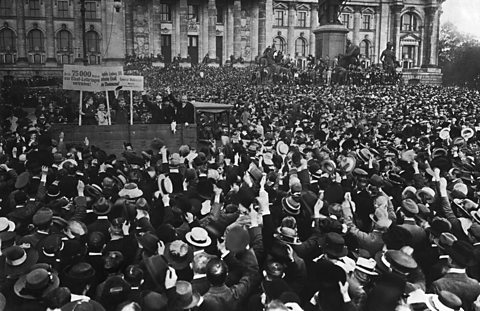Resentment towards the Treaty of Versailles - Why the Nazis achieved power - Higher History Revision - BBC Bitesize (original) (raw)
Resentment towards the Treaty of Versailles

Figure caption,
Mass demonstration in front of the Reichstag against the Treaty of Versailles 1919
The German Government had agreed to sign the Treaty of Versailles in June 1919 to make peace. This action was very unpopular in Germany. Enemies of the government used the treaty to claim that it had ‘stabbed Germany in the back’ by ending the war.
The terms of the Treaty were very damaging to Germany:
- territory was taken from Germany - depriving it of valuable industrial and agricultural income
- Article 231, the War Guilt Clause blamed Germany and her allies for starting the war – this led to feelings of humiliation and anger
- Germany had to pay reparations of £6.6 billion - this ensured that the economy would not recover
- Germany's armed forces were greatly reduced
The video below describes the contents of the Treaty of Versailles.
The link to the armistice and Treaty of Versailles had serious repercussions for the Weimar Government.
The Weimar Government was associated with failure in World War One since it had signed the Treaty of Versailles that had ended the war. Many nationalists believed the government had sold Germany out to its enemies by ending the war too early.
The November Criminals and the legend of the Stab in the Back were phrases used in many of Hitler’s speeches.
Ideas that the Treaty was signed by anti–patriotic left wing politicians (the November Criminals), and that these same politicians were responsible for the 'stab in the back' of the army that led military defeat in 1918, discredited the Weimar Government.